The Ford AOD 4-Speed Overdrive Modernized The Blue Oval's Automatic Transmissions
The '80s marked a revolution in automatic transmission design from Detroit's Big 3, as Ford, Chrysler, and General Motors moved on from the three-speed units that had dominated the past two decades and embraced overdrive. The addition of a fourth gear that significantly dropped engine revs during highway cruising not only allowed for better fuel mileage across the board, but it also helped engineers install more aggressive gear ratios for the first three cogs, and in the rear end, boosting performance across the board.

One of the most notable transmissions to come out of this burst of transmission development was the Ford AOD. The 'Automatic Overdrive' gearbox was based in part on the popular C4 available in a long list of cars and trucks, and it quickly became the self-shifter of choice for an entire generation of '80s and '90s autos. Even after it had left the new vehicle market, the Ford AOD and its AOD-E sibling went on to enjoy a second life as a popular hot rod option.
Long Time Coming
The story of the AOD surprisingly begins in the early 1960s. It was no secret that four gears was better than two or three for a variety of reasons, and Ford had begun research into building a transmission that would integrate a fourth gear directly into its design rather than tacking one on to an existing three-speed. After a many-year hiatus, Ford revived its four-speed plans in the mid-'70s when the energy shock resulting from that decade's first oil embargo once again made efficiency a priority. With nothing but large-displacement V8s on the shelf, the Blue Oval needed to find a way to reduce the powerful thirst associated with its larger cars and trucks, and a more advanced transmission design seemed like a good place to start.

As a stop-gap, Ford updated the C4 transmission with a locking torque converter, calling it the C5. The C4's design dated back to Ford's FMX gearbox of the 1950s, which over time had been both lightened and strengthened (with a more heavy-duty version, the C6, found mostly in trucks).

By the time the AOD arrived the FMX's BorgWarner-sourced bones had faded almost completely into the background. Presented as an entirely-new setup that leaned on the Ravigneaux geartrain found in the FMX, it bundled a 0.67:1 fourth gear to make it the first overdrive transmission offered by an American car company. Mechanically-activated, first gear was typically 2.40:1, with a 2.84:1 ratio also available. Second gear features a 1.46:1 ratio, with third direct drive. It also swapped in a throttle valve control cable in place of the vacuum modulator found on the C4 and C6 designs.

Quirky But (Eventually) Strong
As might be expected by the standards of late-'70s science, the AOD (also known as the XT-LOD and the FIOD when it was first introduced), went through a series of growing pains before it could be considered a completely reliable option. Most issues centered around the overdrive gear, but there was also the case of its curious shift pattern which required moving from first, to drive, and then immediately back into first if you wanted to access second gear manually, as it was missing from the shift pattern. Downshifting from third to second requires a similar mind-melting move from third to first with the shifter. All of these unusual movements resulted in additional wear, and on top of this the throttle cable's infinite adjustability also required careful calibration to avoid burning out the gearbox.

The sheer ubiquity of the AOD, however, made up for its foibles. Starting in 1979 Ford unleashed the transmission across the full Fox body family as well as in its half-ton pickup trucks, and it wasn't long before almost every vehicle it built—ranging from the Mustang to the Thunderbird to Lincoln products like the Town Car and the Mark VII—featured the overdrive transmission.

With so much metal rolling down the highway, and via the participation of a number of racing teams and aftermarket vendors, Ford was able to continuously upgrade the AOD, with later examples proving far sturdier (and with improved main shaft lubrication arriving in 1988).

By 1991, Ford had moved the platform to electronic controls, calling it the AOD-E, and a further update occurred the year after with the 4R70W (which featured a 0.70:1 fourth gear).

These transmissions were fundamentally different from the AOD, although they were built using the earlier design as a starting point, and only the gearsets are interchangeable. The AOD-E was used on vehicles equipped with pushrod engines (particularly the 5.0 and the 5.8-liter V8s) until roughly 1995, when the full switch over to the 4R70W occurred.

The latter became Ford's go-to transmission for any vehicle with a modular engine and a rear-wheel drive layout.
Cheap And Tempting
So many years later, the AOD has become an attractive transmission for custom car projects for a variety of reasons. The first is fitment: roughly the same size and shape as the C4, and featuring a common 6-bolt bellhousing, it's an easy drop-in replacement that instantly adds overdrive to any number of classic 60s and 70s Ford rides with small block V8 engines (big blocks typically require an adaptor kit). It also can be adapted to GM platforms with a minimum of hassle using a single plate and a modified tailshaft housing. This has proven a blessing not just for Chevrolet, Pontiac, Buick, and Oldsmobile owners, but also to Ford builders who want to move to a small block Chevy V8.

The reliability problems and strange shift pattern of the Ford AOD transmission have also been dealt with by the aftermarket, and there are now so many upgrades available to the unit that it's possible to build a version of the transmission the specifically fits your project's needs. Cheap to purchase used thanks to the millions of examples that are now sitting in junkyards, the Ford AOD is a compelling choice for drag racers and resto-modders alike.











